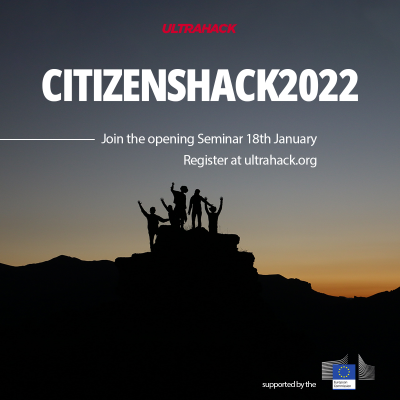Description
Citizens and local communities can play an important role in drawing value from R&I ensuring that research results made in Europe translate to benefits for all parts of society. To strengthen engagement of citizens and local societal actors in co-creating and taking up innovative solutions, we need more experimentation and testing of new approaches. The European Commission launches the CitizensHack2022: The action develops and tests (as a virtual event) a knowledge valorisation hackathon as a way for using research results to provide innovative solutions that are co-created with citizens.
Hackathons are commonly events in which community members collaborate to solve problems, within a competition of a short duration (few days). They take different forms, but most are designed to bring together innovators and researchers from various backgrounds to create shareable solutions to problems of common interest. CitizensHack2022 has a special purpose: not simply to design concrete solutions that can be further developed and taken up by cities and communities or commercialised, but rather to test the hackathon as a model which can provide an effective way for valorisation of R&I through co-creation with citizens and be used by different policies and actors.
The aim of the action is to develop a Knowledge Valorisation Hackathon concept and methodology and to test it in real life, with a minimum of 30 teams from at least 15 Member States. Local communities, as well as individual citizens, will be able to apply for participation and define the challenge they wish to address during the Hackathon. These community driven challenges and citizens groups will be matched with researchers to make up the co-creation teams and challenges, of which 30 will be selected to take part to the actual event. Each team will consist of at least two participants from R&I communities (researchers and innovators) and at least two participants from local communities (citizens). Three teams will be awarded as winners of the hackathon, following the decision of the CitizensHack2022 Jury.
Taking into account the current Covid-19 pandemic, the hackathon relies only on on-line tools.
The action will collect feedback and report on the testing, in particular what worked well, what worked less well, what are critical factors for success and how the whole process can be improved. It will also provide recommendations about the use of hackathons (including scale up potential and replication conditions) as a way to promote knowledge valorisation through citizen engagement.
CitizensHack2022 will provide important policy relevant outcomes to strengthen citizen engagement as a channel for knowledge valorisation. If successful, this can apply to many other policy areas and fields.
Registrations for participation opened on 15 November 2021 and will close on 23 January 2022. The hackathon will take place from 10 to 12 February (fully online). An information seminar will take place on 18 January, which will be opened by Jean-Eric Paquet, Director-General Research and Innovation of the European Commission, and include testimonies from citizens and researchers involved in community engagement projects. The seminar will provide further information and allow connecting with a broader audience across Europe.
The service provider of the CitizensHack2022 is Ultrahack, supported by academic and community partners and networks, notably The (OI-Net), Eurocities and Aalto Startup Center (ASUC).
Programme
For further information and registration to CitizensHack2022 and to the information seminar, please see: Ultrahack Hackathon
